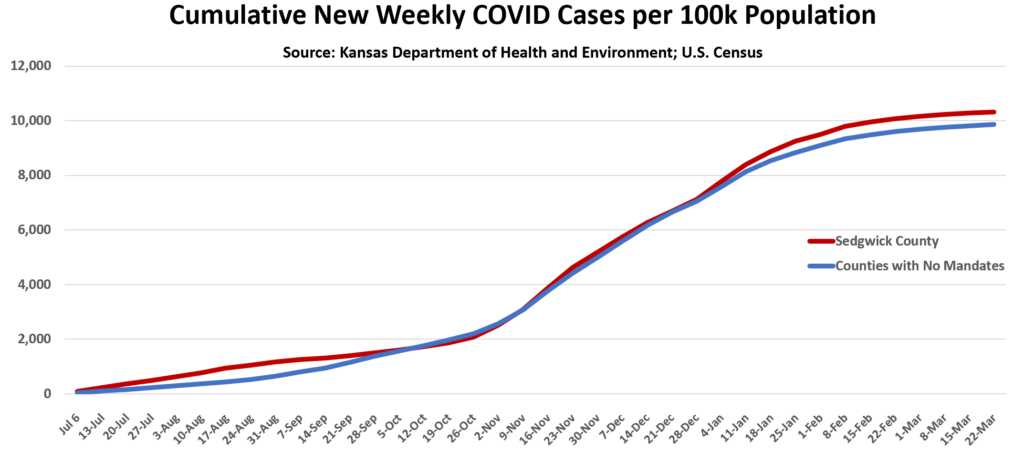In October, Wichita Mayor Brandon Whipple said the city’s mask mandate should remain in effect until the 14-day rolling average positivity rate remained below 5% for two weeks. The rate has been below 5% since February 18 and has continued to decline; it is at just 2.4% today.
But in a display of stunning hypocrisy, he told the Wichita Eagle that rescinding a mandate now is like “… getting the ball up to the 5-yard line and spiking it.”

The Sentinel asked Whipple to answer a few simple questions, including why he wants to continue a mandate, given the low positivity rate.
The Sentinel also asked Whipple to explain the science or other factors prompting his belief that a mandate is required. And given that even in the absence of a mandate, private businesses could still require masks at their discretion, Whipple was asked why he doesn’t believe business owners are capable of making their own informed decisions.
Whipple didn’t respond. Communication Manager Megan Lovely wrote, “the Mayor’s schedule does not allow him to have time to respond today before your deadline.” The Sentinel wrote to Whipple at 10:00 am on Thursday and gave him until 2:00 pm on Friday to respond.
City Councilman Bryan Frye says the mandate should be lifted.
“I have consistently been against a Wichita mask ordinance as COVID is a public health issue and should be addressed by the local board of health aka Sedgwick County Board of Health and not the Wichita City Council. Now that we are well below the 5% positive test rate benchmark established last year by the city council, hospitals are no longer stretched to their limits and there are multiple vaccines widely available, it makes no sense to create a new mask mandate by the city council. I will continue to encourage people to vaccinate, wear masks and practice social distancing as we get closer to herd immunity. Especially if an individual is considered high risk.”
Masks produce little to no change
As the Sentinel reported earlier this week, the data shows mask mandates have had almost no effect on COVID case growth.
When Kansas Governor Laura Kelly issued a new statewide mask mandate in November, 38 counties adopted it, 43 counties rejected her mandate, and 24 counties continued their enforcement of her July mandate.
As of March 22, KDHE data shows the counties without a mandate added 5,441 cases per 100,000 of population since November 23. The counties that had a mandate in effect since July added 5,439 cases; that difference of just two cases over 17 weeks in 43 counties is virtually unnoticeable.
Seven of the 38 counties that adopted Kelly’s November mandate dropped them in late December and January according to the Kansas Association of Counties. The other 31 counties that still had the mandate added 5,341 cases per 100,000 of population.
Those 31 counties had just a 100-case difference over 17 weeks; that’s about six fewer cases per week or only .019 cases per week for each of those 31 counties.
Cases have grown a little faster in Sedgwick County than in the counties that rejected Gov. Kelly’s mask mandate. Between June 29 and March 22, Sedgwick County added 10,315 cases per 100,000 of population, or about 5% more than the counties without a mandate.

To be clear, comparisons of case growth in counties with and without mandates are not about the efficacy of wearing masks; rather, it shows that mask mandates had no real impact on COVID case growth.


